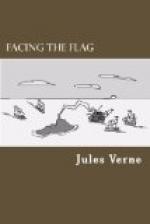August 20.—For two days no incident worth recording has occurred. I have explored Back Cup to its extreme limits. At night when the long perspective of arched columns are illuminated by the electric lamps, I am almost religiously impressed when I gaze upon the natural wonders of this cavern, which has become my prison. I have never given up hope of finding somewhere in the walls a fissure of some kind of which the pirates are ignorant and through which I could make my escape. It is true that once outside I should have to wait till a passing ship hove in sight. My evasion would speedily be known at the Beehive, and I should soon be recaptured, unless—a happy thought strikes me—unless I could get at the Ebba’s boat that was drawn up high and dry on the little sandy beach in the creek. In this I might be able to make my way to St. George or Hamilton.
This evening—it was about nine o’clock—I stretched myself on a bed of sand at the foot of one of the columns, about one hundred yards to the east of the lagoon. Shortly afterwards I heard footsteps, then voices. Hiding myself as best I could behind the rocky base of the pillar, I listened with all my ears.
I recognized the voices as those of Ker Karraje and Engineer Serko. The two men stopped close to where I was lying, and continued their conversation in English—which is the language generally used in Back Cup. I was therefore able to understand all that they said.
They were talking about Thomas Roch, or rather his fulgurator.
“In a week’s time,” said Ker Karraje, “I shall put to sea in the Ebba, and fetch the sections of the engines that are being cast in that Virginian foundry.”
“And when they are here,” observed Engineer Serko, “I will piece them together and fix up the frames for firing them. But beforehand, there is a job to be done which it seems to me is indispensable.”
“What is that?”
“To cut a tunnel through the wall of the cavern.”
“Through the wall of the cavern?”
“Oh! nothing but a narrow passage through which only one man at a time could squeeze, a hole easy enough to block, and the outside end of which would be hidden among the rocks.”
“Of what use could it be to us, Serko?”
“I have often thought about the utility of having some other way of getting out besides the submarine tunnel. We never know what the future may have in store for us.”
“But the walls are so thick and hard,” objected Ker Karraje.
“Oh, with a few grains of Roch’s explosive I undertake to reduce the rock to such fine powder that we shall be able to blow it away with our breath,” Serko replied.
It can easily be imagined with what interest and eagerness I listened to this. Here was a ray of hope. It. was proposed to open up communication with the outside by a tunnel in the wall, and this held out the possibility of escape.




